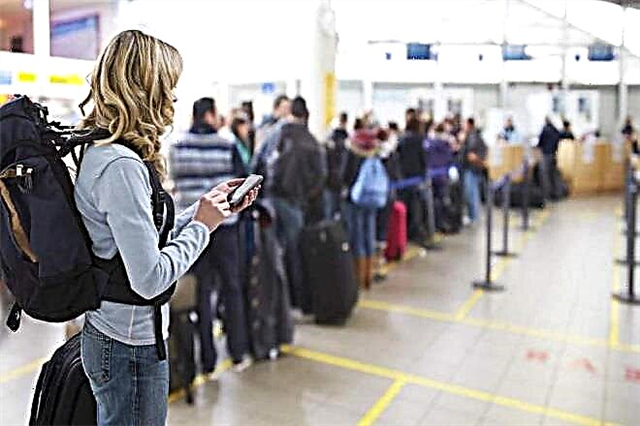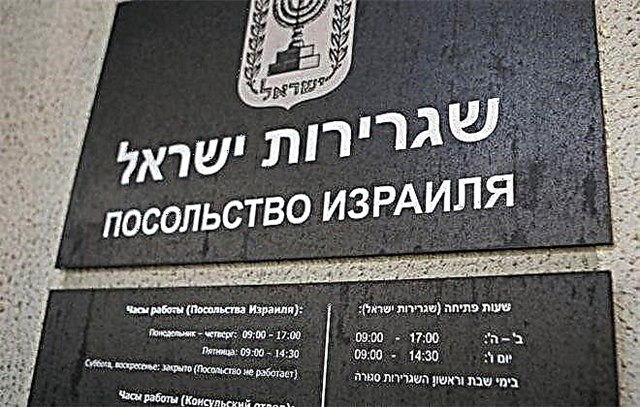To exercise the right to repatriate to Israel, you need to go through a series of preparatory procedures, which are completed by a consular check at the Israeli embassy. The diplomatic representative of the state decides whether the applicant who applied to him meets the requirements of the "Law on Return". If the consul made a positive decision, a visa is affixed to the applicant's foreign passport, which grants the right to permanent residence (permanent residence) in Israel.

How to prepare for the check
Repatriation to Israel ("aliyah") is the return to their historical homeland of Jews, foreign citizens with Jewish roots, as well as members of their families who have been outside their country for a long time. The legal basis for repatriation is the 1950 Israeli Return Law.
If, upon family reunification (if there is a spouse in Israel), applicants are first issued a residence permit (residence permit), then a permanent residence permit, and only five years later they are assigned the status of a citizen, then repatriates with Jewish roots, after immigration to Israel, are granted Permanent residence practically immediately receive citizenship. It is worth remembering that belonging to the Jews is determined by the maternal line.
Before making an appointment with the consul, you should familiarize yourself with the requirements for applicants contained in the "Law of Return" and assess the degree of your compliance with them. It is important to clarify which of the documents required for verification are available, and which ones need to be obtained from certain authorities.
Those who need more information about the move are advised to contact the representatives of the Jewish Agency for Israel, also known as the Sokhnut. The main activity of this center is the search for those who have the right to repatriation, as well as assistance to them in organizing the relocation.
Sokhnut employees will be able to answer questions relevant to most potential repatriates, explain exactly what documents are needed for the Israeli embassy, and inform them when it is approximately worth expecting a consul to arrive in a particular region for field interviews.
They will also tell you which of the Israeli cities is better to choose for permanent residence, what programs in the state exist to provide work for repatriates. "Sokhnut" can fully or partially pay for the transfer to Israel.
You can go to the official website of the Jewish Agency for Israel at www.jewishagency.org.
How to make an appointment with the consul
Anyone who wishes to return to their historical homeland must personally contact the employees of the repatriation department of the Israeli Embassy in the Russian Federation in Moscow to make an appointment with the consul for an interview.
To do this, you do not have to go to the capital, you can call one of the following numbers:
- +7 (499) 238-96-16;
- +7 (499) 238-15-63;
- +7 (499) 238-58-41.
It should be noted that the reception is carried out exclusively by appointment. The department employee who will receive the call must provide his / her data (last name, first name, patronymic, date of birth, contact phone number), and also leave similar information about all relatives who also plan to leave.
The presence at the interview of all family members (including minor children from the age of three) who have made an appointment at the Israeli Consulate in Moscow and are going to exercise the right to repatriation is mandatory.
During a telephone conversation with an employee of the embassy, a candidate should clarify whether he will come with his family in person to Moscow or will wait for the arrival of the consul in his region.
The fact is that once every few months, diplomatic representatives conduct field interviews in other cities of Russia, if a large number of applications have been received from their residents.

You can make an appointment at the Israeli Embassy in Moscow from 09.00 to 17.00 from Monday to Thursday. On Fridays, for this purpose, you should call from 09.00 to 14.00.
Citizens have the opportunity to make an appointment with the embassy staff on many other issues on their own online. For this purpose, you need to send an application on the website of this diplomatic institution.
But there is no electronic queue at the Israeli consulate for an interview for repatriation.
What documents will be needed
First of all, you will need to submit an application. It is an application form drawn up in the form of a questionnaire. You can get the application form directly from the repatriation department of the Embassy. You need to fill out the document before starting the interview with the consul.
There are several standard requirements for the design of the questionnaire, in particular:
- It should be filled in in Russian.
- The data must be entered in block letters, legibly.
- When filling, it is allowed to use black or blue ink.
The application form is filled in by the head of the family in one copy in the presence of other relatives who will travel to Israel with him. The consul will carefully study the content of the document, compare it with the answers received from all candidates at the interview, and make a decision based on the results of the check.
If the questionnaire is filled out incorrectly, the visa application will most likely be refused.
In addition to the application form, you will need the following documents for repatriation to Israel:
- One color photo of each family member who plans to leave (including newborns). The photograph should be 3 by 4 cm in size.
- Foreign passports of each family member (must be valid for at least six months from the date of visa issuance).
- Birth certificates of all traveling family members.
- Birth certificates of their parents.
- Marriage certificates of parents.
- Birth certificates of grandparents.
- Marriage certificates of grandfathers and grandmothers.
- Death certificates for Jewish relatives.
- Education documents.
- Labor books.
- Military, pension, trade union and other tickets.
- Documents of close relatives living in Israel, their contact details.
This list can be supplemented at the discretion of the consul and depending on the personal situation of each candidate. Documents must be submitted exclusively in original.
What questions are asked during the interview
After all applicants fill out the application forms, and the consul verifies the authenticity of the documents provided, the interview for repatriation to Israel begins. The diplomatic representative will ask each of those present a few questions.
Most often the consul is interested in:
- the presence of Jewish roots;
- the motives for repatriation;
- the applicant has / does not have plans to live in Israel after repatriation;
- the fact that the candidate was not involved in crimes of any kind;
- presence / absence of infectious diseases in an active stage in a potential repatriate;
- type of activity of the applicant in Russia and plans for employment in Israel.
The questions of the consuls of Israel to children concern whether they want to live in Israel and why, in which settlement of this country their relatives live, how they see life after moving (the complexity of the questions, of course, depends on the age of the child).
When communicating with the applicant, the diplomatic representative closely monitors his reaction, voice, convincing answers, which undoubtedly affect the final decision.
It is impossible to say exactly how long the interview lasts.As practice shows, an interview with the consul of Israel can take from several minutes to an hour or more. The length of the conversation is not least influenced by the applicant's ability to instill confidence in the consul.

After the approval of the repatriation, the candidate must move to his historical homeland within six months. If the consul demanded additional documents, a secondary consular check for repatriation to Israel is assigned to provide them.
Interview Code of Conduct
When meeting with the consul, the conversation must be friendly. Do not be afraid of an official. He is the same person as every potential repatriate. And the fact that he is entitled to influence, to a certain extent, the course of life of others, should not cause a negative attitude towards him.
No matter how provocative a question is asked, it is necessary to maintain composure, keep calm and at ease. You should not try to evade answers, hide information or provide false information about yourself.
Thanks to many years of experience, an official can easily convict the interlocutor of a lie, and this is fraught with refusal to repatriate without the right to re-submit documents. These are the top tips on how to deal with the Israeli consul during your interview.
What to do in case of refusal
If the consul's answer was negative, the procedure can be restarted. You will need to go through the same steps (make an appointment at the embassy, prepare a package of documents, fill out an application form, answer questions during the interview), but taking into account previous mistakes.
If the applicant believes that the refusal to repatriate was unreasonable and unlawful, he can seek help from a lawyer. The specialist will examine the case in detail before submitting it to the court, give a legal assessment to the actions of the consul, and help prepare the necessary official papers, including those stored in the state archives.
Representatives of Sokhnut can provide similar legal support.
As a result
The Israeli "Law of Return" provides citizens of other countries with Jewish roots with the opportunity to return to their historical homeland and obtain Israeli citizenship.
Repatriation applicants are required to complete the standard consular screening process. It includes three stages: submitting an application in the form of a questionnaire, providing a package of documents and passing an interview at the Israeli consulate. Based on the results of the check, the representative of the State of Israel decides to issue a visa to the candidate for permanent residence in Israel.











